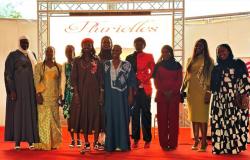From the APS special correspondent: Sokhna Bator Sall
Riyadh, Dec 16 (APS) – Digital technology must be a universal service with a positive impact for the change of humanity, pleaded, Monday, the coordinator of the Fund for the development of the universal telecommunications service in Senegal (FDSUT), Ndèye Fatou Blondin Diop.
“Today, everyone cares [de voir] the introduction of the Internet into everyday life [induire] a positive change for humanity. It questions data collection, privacy, data ethics,” she said.
This question also concerns “the reduction of gender gaps and inequalities”, sustainable development, but also the gaps between the rural and urban world, the North and the South, she added in an interview with the APS Special Envoy to the 19th Annual Meeting of the Internet Governance Forum (IGF).
“Building our multi-stakeholder digital future” is the theme of this meeting, which is being held in Riyadh, the Saudi capital.
According to Ndèye Fatou Blondin Diop, digital technology must be “a universal service with a positive impact for the change of humanity”.
But “whether it is digital inclusion or connectivity, we are changing paradigms in the world and we are bringing new ones that are not without risks,” she said.
Hence the need to question “the needs of populations, in particular better health, digitalized local governance, access to administration”, among other issues.
All this “requires inclusion, training, confidentiality”, so that people realize that the Internet is a “great tool, but one that must be used with caution” for it to have a positive effect, observed the coordinator of the Fund for the development of universal telecommunications service in Senegal.
With three operators, coverage of most major cities and operability between the different services, “Senegal is making great progress” in this area.
“However, we must work on prices, quality of services, but also digital inclusion through universal service. We still have a way to go, because it is a sector that provides jobs,” she noted.
The main question is to ensure that young people, “with their genius and their abilities, can use these tools,” insisted Ndèye Fatou Blondin Diop. The State must give these young people the means to have access to the job market and to have a backlog of orders as entrepreneurs, added Ms. Diop.
“This is where Senegal has challenges. The President of the Republic, through his trips abroad, highlights this as a concern, with the aim of building a digitalized Senegal in an era of modernization. We are ready to move towards this 2050 agenda,” continued Ndèye Fatou Blondin Diop.
She returned to the missions of the Fund for the development of the universal telecommunications service, particularly with regard to the management of so-called “gray” areas where operators do not go, because they do not have a return on investments in the short term.
She recalled that this led the State of Senegal to set up a Fund financed by a contribution from operators, part of which was intended to subsidize the arrival of connectivity in rural areas.
“In addition, there is everything we call digital inclusion, in particular services to public establishments, local administration, health structures. All this is included in digital inclusion, in addition to poverty reduction with women, the rural world,” said Ms. Diop.
The Fund for the Development of Universal Telecommunications Service also has the mission of establishing partnerships validated by the State, she clarified, referring on this subject to collaboration with the World Bank or other institutions or Funds which help “to accelerate this process of territorial connectivity”, so that “from 2025, certain localities will be covered” by the Internet network.
“This is the reason for our presence at this Internet Governance Forum (IGF), explained Ndèye Fatou Blondin Diop.
SBS/BK





